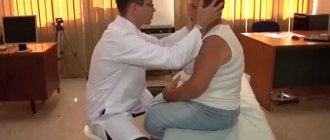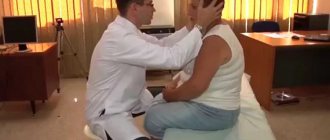What should be considered dizziness?
Dizziness
is one of the most common complaints among adult patients; most often they only complain of headache or back pain.
However, dizziness can mean completely different symptoms. Patients often call dizziness:
- darkening of the eyes
after a sudden change in position; - a veil before my eyes
; - presyncope (feeling of impending loss of consciousness). In this case, they usually complain of dizziness and weakness;
- imbalance
(instability and
staggering when walking
); - feeling of faintness
, a state reminiscent of intoxication. In this case, the complaint usually sounds like nausea and dizziness.
Dizziness
Such symptoms are certainly significant and may indicate various diseases (anemia, low blood pressure, vegetative-vascular dystonia, diseases of the cardiovascular and respiratory systems), but are not dizziness itself. True vertigo
(or
vertigo
) is a condition in which the patient has a feeling of rotation of actually stationary objects around him or, conversely, a false sensation of his own rotation or movement.
Quite often it is accompanied by nausea, vomiting, and increased sweating.
When should you see a doctor?
You should sound the alarm if dizziness becomes regular or prolonged. Get immediate help if you experience severe dizziness and unsteadiness along with the following symptoms:
- sudden headache;
- painful sensations in the chest area;
- labored breathing;
- numbness or weakness of the limbs;
- fainting;
- fast or intermittent heartbeat;
- slow or slurred speech;
- problems with coordination;
- continued vomiting;
- convulsions;
- sudden hearing loss;
- numbness or facial asymmetry.
Causes of dizziness
Control over the position of the body in space is ensured by the joint action of three anatomical systems of the body:
- vestibular. The vestibular apparatus is located deep in the skull and includes sensitive receptors that respond to the movement of the body in space;
- visual. The eyes provide basic information about our position in relation to objects in the world around us and the position of parts of our body in relation to each other.
- peripheral sensory receptors found in muscles, joints and bones, which also provide the brain with information about the position of various parts of the body.
Stimulation of one or more of these systems can lead to dizziness (as, for example, dizziness occurs as a result of riding on a merry-go-round). If dizziness appears without any external reason, then the nature of such dizziness is obviously pathological. Most often, the cause of true (or, as it is also called, systemic) dizziness is a violation of the vestibular apparatus.
Treatment
Conservative therapy
Therapeutic tactics are determined by the type of pathology that provoked severe dizziness:
- Diseases of the inner ear
. For organic lesions, antipsychotics, anticholinergics, vasodilators, and antihistamines are used. Patients with BPPV undergo training of the vestibular apparatus. - Vestibular neuronitis
. Symptomatic therapy is carried out using vestibulosuppressors and benzodiazepine tranquilizers. The duration of the course is determined by the severity of dizziness. - Cerebrovascular disorders
. In case of strokes, measures are taken to maintain vital functions, regulate hemostasis, and prevent cerebral edema. Anticonvulsants, hypothermic and antiemetics, and neuroprotectors are prescribed symptomatically. For atherosclerosis, lipid-lowering medications and neurometabolites are used. - Heart diseases
. The treatment program may include narcotic analgesics (for heart attack), beta-blockers, antiarrhythmic drugs, thrombolytics, calcium antagonists. - Intoxication
. It is necessary to discontinue the medication that caused severe dizziness. Detoxification is in progress. Symptomatic treatment is carried out. For carbon monoxide poisoning, oxygen therapy is used. - Anemia
. Patients with iron deficiency anemia benefit from a diet rich in iron. Iron supplements are recommended, and blood transfusions are sometimes required. Therapy for crises in sickle cell anemia involves dehydration, oxygen therapy, administration of analgesics, antiplatelet agents, anticoagulants, and sometimes red blood cell transfusions.
Surgery
Depending on the etiology of severe dizziness, patients may be indicated for the following operations:
- Pathologies of the inner ear
: tympanotomy, perforation of the base of the stapes, fenestration of the semicircular canal, laser destruction of the labyrinth. - Circulatory disorders in the brain
: carotid endarterectomy, formation of vascular shunts, arterial replacement, occlusion and clipping of aneurysms. - Heart diseases
: coronary artery bypass surgery, coronary artery stenting, installation of pacemakers. - Acute blood loss
: suturing open wounds and sources of bleeding in internal organs, ligating damaged vessels.
Diseases that may cause dizziness
Most often, dizziness occurs with the following disorders:
- ear diseases
, first of all:- Benign paroxysmal positional vertigo (BPPV).
BPPV accounts for up to 80% of all cases of true dizziness. The name of this disease means that it does not pose a serious threat (therefore - benign), that attacks of dizziness occur suddenly (therefore - paroxysmal), that the attack begins when the position of the head changes - turning or tilting (therefore - positional). The cause of dizziness is the displacement of hard formations (otoliths) in the inner ear. Although BPPV may cause nausea and weakness, no other pathological changes are found on examination; - labyrinthitis
(inflammation of the inner ear); - Meniere's disease
(characterized by an increase in fluid in the cavity of the inner ear) - causes severe dizziness, accompanied by tinnitus, nausea, vomiting, and a feeling of fullness in the ear; may lead to hearing loss; - tumor (neurinoma) of the auditory nerve
; - barotrauma
– rupture of the eardrum due to a sudden change in pressure; - other ear diseases
- otitis media, eustachitis, cerumen plug;
, including:
migraine
(caused by disorders of the brain structures responsible for pain and other sensations) - dizziness during migraine is a harbinger of a painful attack;
;
;
- diseases of the cervical spine
(primarily
osteochondrosis
); - psychogenic dizziness
is not true dizziness (that is, it is not associated with pathology of the vestibular apparatus). Most often described as a feeling of unsteadiness, brain fog, fear of falling and passing out. Occurs as a reaction to stress, usually accompanied by other psychogenic symptoms; - some other diseases.
Mechanism of development of vertigo
If we consider dizziness from an anatomical point of view, the causes of this condition are quite simple. The vestibular apparatus, responsible for human balance and coordination in space, is located in the inner ear. Vision and muscle reflexes help a person navigate the environment. All received information enters the brain. And it is he who controls the functioning of the vestibular apparatus.
Sometimes the connection between the inner ear and the brain can become disrupted. A person loses the ability to navigate in space. Dizziness appears. To restore the lost connection, the brain immediately launches several reactions at once. Some of them may affect neighboring centers (for example, emetic). This leads to the appearance of unpleasant accompanying symptoms.
Dizziness and weakness
Dizziness and weakness can occur in many cases. This condition does not always mean that you are sick. Thus, in adolescence, weakness and dizziness are explained by hormonal changes. The autonomic nervous system is being rebuilt and growth rates are accelerating. Against this background, weakness, dizziness and even fainting are possible. Also, dizziness and weakness are typical during pregnancy.
If the cases mentioned do not apply to you, dizziness and accompanying weakness most likely indicate some kind of pathology. Weakness and dizziness are most often observed with:
- anemia (low hemoglobin content in the blood);
- cerebrovascular accident. In this case, tinnitus, decreased attention, and the appearance of black spots before the eyes may also occur;
- a sharp increase in blood pressure (hypertensive crisis). In this case, dizziness and weakness may be accompanied by a headache;
- neurocirculatory dystonia;
- oncological diseases.
Diagnostics
The cause of severe dizziness is determined by a neurologist. Taking into account the existing symptoms, the patient may be referred for consultation to a vestibulologist, otolaryngologist, cardiologist, and other specialists. Dizziness is subjective and often difficult to describe. Therefore, the most important task at the initial stage of the examination is to reliably establish the presence of a symptom by differentiating it from other manifestations (visual impairment, headache).
The specialist refrains from offering his own formulations, collects complaints in detail, and asks about feelings. To determine the level of damage, a detailed neurological examination is performed to confirm neurological disorders, coordination disorders, the presence and type of nystagmus, and the preservation of the vestibulo-ocular reflex. The final diagnosis is made based on the results of the following procedures:
- Research of the vestibular analyzer
. The complex includes positional tests, caloric tests, videonystagmography, videooculography, stabilography. - Hearing research
. In diseases of the inner ear (with the exception of BPPV), hearing impairment is detected during testing with tuning forks and audiometry. If there are no disorders, selective damage to the vestibular analyzer should be suspected. - and MRI.
Informative for circulatory disorders in the brain, head injury, lesions of the inner ear. Irreversible changes due to ischemic and hemorrhagic strokes, hematoma, damage to solid structures and brain matter in trauma are well detected. For patients with cerebral atherosclerosis, MRI of cerebral vessels is recommended. - Sonography
. Using ultrasound of cerebral vessels, atherosclerotic changes are visualized. According to echocardiography, the morphofunctional parameters of the heart are determined, signs of ischemic heart disease and other cardiac pathologies are detected, which can provoke arrhythmias that cause dizziness. The results of echoencephalography confirm increased intracranial pressure and displacement of brain structures due to TBI. - Lab tests
. A general blood test makes it possible to establish the fact of blood loss and determine the type and severity of anemia. Detection of blood in stool is indicative of gastrointestinal bleeding. For victims of carbon monoxide poisoning, a carboxyhemoglobin test is performed. For intestinal infections, bacteriological examination of stool is carried out, and serological tests are performed.
Consultation with a vestibulologist
Preventive methods
Dealing with dizziness is very unpleasant. Therefore, it is better to prevent the pathological condition. This can be done using the following methods:
- Transition to a healthy lifestyle.
- Exercises with moderate physical activity, the so-called vestibular gymnastics is very effective.
- Refusal of alcohol, cigarettes, salty, fatty, sweet, starchy foods.
- Including healthy foods in the diet: fresh vegetables, fruits, berries, protein foods, seafood, freshly squeezed juices.
- Drinking enough clean water without gas. Herbal teas are welcome.
- Get proper rest, eight hours of sleep in a ventilated room.
- No nervous shock.
Despite the fact that there are many ways to prevent the disease, as well as effective treatments at home, if any type of dizziness occurs, you should immediately consult a doctor. Only a competent specialist will help solve this difficult task.
First aid
In case of severe attacks of dizziness, the victim must be given first aid. A person should take a horizontal position, take a few drops (8-10) of atropine 0.1% solution. And, of course, do not forget about ensuring the flow of fresh air. In some cases, it may be necessary to relieve nervous tension with sedatives or tranquilizers.
Further assistance should be provided by a doctor. Only a specialist can identify the cause of dizziness and prescribe effective treatment. It is quite possible that to find out a more complete picture of the disease and an accurate diagnosis, you will need to consult different doctors: a therapist, a neurologist, an endocrinologist, an otolaryngologist.










